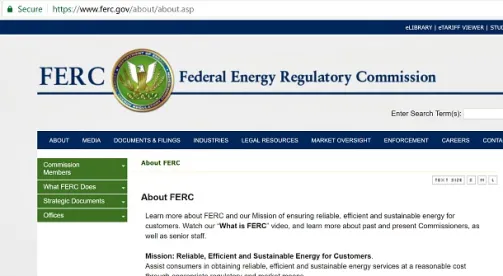On April 14, 2023, the U.S. Supreme Court issued an opinion that is expected to result in historic changes to the Federal Energy Regulatory Commission’s (FERC) use of in-house administrative law judges (ALJs). In Axon Enterprise, Inc. v. Federal Trade Commission, et al., (Axon), the Court unanimously held that federal district courts may hear constitutional challenges to regulatory enforcement actions taken by federal agencies before final agency adjudication. While the Court’s holding in Axon applies to the Securities and Exchange Commission (SEC) and the Federal Trade Commission (FTC), it is expected to be applied in two active cases concerning FERC. Currently, these two cases challenging the constitutionality of FERC’s use of ALJs are working their way through the Fifth Circuit. Importantly, both TotalEnergies Gas and Rover Pipeline, LLC (collectively, the FERC Cases) are stayed pending the resolution of Axon.
Writing for the Court in Axon, Justice Kagan reasoned “[constitutional] claims cannot receive meaningful judicial review through the FTC Act or [SEC] Exchange Act. They are collateral to any decisions the Commissions could make in individual enforcement proceedings. And they fall outside the Commissions’ sphere of expertise.” Accordingly, the Court found that constitutional claims are not “of the type” SEC and FTC statutory review schemes reach. In turn, “[a] district court can therefore review them.” As a practical matter, FTC and SEC enforcement actions will take place in federal district courts, except where only administrative relief is possible.
In the pending FERC Cases, two district courts in Texas are weighing constitutional challenges to FERC’s structure. The similarities between the regulatory framework in Axon and that at issue in the FERC Cases is acknowledged by all parties to those matters. For example, in Rover Pipeline, LLC, FERC attorneys motioned for stay, arguing the decision in Axon will apply to the “substantially similar statutory scheme under the Natural Gas Act.” In both cases, the courts agreed with this line of reasoning.
The expected limits on FERC’s in-house adjudication process is likely to primarily impact the FERC enforcement process in natural gas cases. While the Federal Power Act (FPA) already gives targets of FERC enforcement the choice of de novo review in federal district court, enforcement actions arising under the Natural Gas Act can only be adjudicated by FERC ALJs. Agency enforcement proceedings are lengthy and time-consuming. Indeed, in instances where the enforcement target is given the option to pursue de novo district court review — such as under the FPA — the overwhelming majority of litigants choose that route.
The future of FERC ALJs, and in-house administrative adjudication generally, is rapidly evolving. With broader challenges to these federal regulatory practices on the horizon, it will be important to monitor the situation closely.





 />i
/>i

